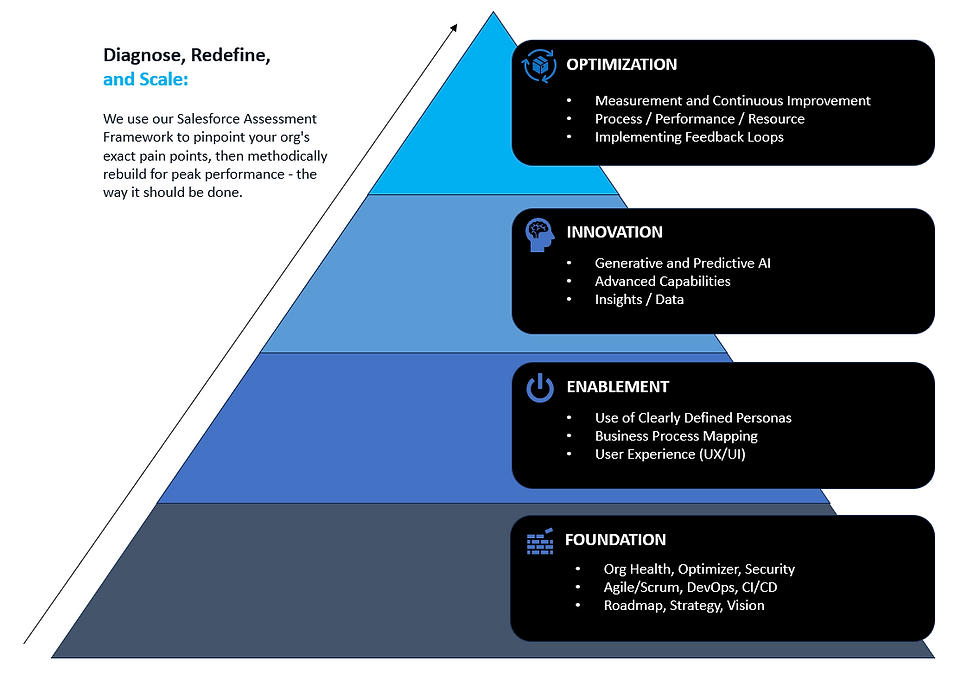When to Ditch Your Salesforce Implementation: Time for a Fresh Start or even a New CRM?
- Jon Ewoniuk
- Feb 18, 2024
- 3 min read
Salesforce is a powerful CRM, but it's not a one-size-fits-all solution. There are times when clinging to an outdated or inefficient implementation can hinder your business growth. This begs the question: when is it time to ditch your current Salesforce and consider a fresh start or a new CRM altogether?
Here are some red flags that indicate your Salesforce might be holding you back and it may be time to take action:
1. Persistent User Adoption Issues:
Low user engagement and resistance to using the platform is a major sign of trouble.
Complex interfaces, cumbersome workflows, and lack of training can lead to frustration and hinder adoption.
If attempts to improve user experience haven't yielded results, it might be time to explore alternatives.
2. Data Quality, or lack thereof:
Inaccurate, incomplete, or inconsistent data renders reports unreliable and hinders effective decision-making.
Difficulty maintaining data integrity despite cleaning efforts suggests deeper structural issues within the implementation.
A data-driven business needs a CRM that prioritizes data quality and provides robust data management tools.
3. Constant Customization Headaches:
Extensive customizations can become a maintenance nightmare, hindering future upgrades and integrations.
If your Salesforce feels like a monster of custom code, it might be time to consider a more user-friendly and adaptable solution.
Evaluate if the benefits of customization outweigh the ongoing complexity and maintenance burden.
4. Lack of Scalability and Flexibility:
As your business grows, your CRM needs to evolve alongside it.
If your current Salesforce struggles to accommodate your expanding needs or integrate with new tools, it might be time to explore more scalable options.
Consider your future growth trajectory and choose a CRM that can adapt and support your evolving requirements.
5. Feeling Overwhelmed by Costs:
Excessive licensing fees, maintenance costs, and ongoing support expenses can strain your budget.
If the cost of maintaining your current Salesforce outweighs the value it delivers, it's time to re-evaluate your options.
Explore cost-effective alternatives that offer similar functionality without breaking the bank.
Beyond these red flags, consider these additional factors:
Is your current vendor providing adequate support and guidance?
Does the platform align with your evolving business needs and industry best practices?
Are there newer, more user-friendly CRMs that offer better value and functionality?
When to Start Fresh with a New Salesforce Implementation:
In some cases, starting fresh with a new Salesforce implementation might be the better option compared to trying to fix the current one.
Here are some scenarios where this might be the case:
Outdated or significantly customized setup: If your initial implementation was done years ago or heavily customized, it might be easier and more efficient to start anew with best practices and current functionalities.
Significant data quality issues: If your data is riddled with inaccuracies and inconsistencies, cleaning and migrating it to a new, well-structured instance might be more feasible than attempting to fix the existing one.
Loss of access to previous implementation team: If you no longer have access to the team that built your original Salesforce or their expertise is outdated, starting fresh with a new implementation partner might be the best course of action.
Remember, ditching your Salesforce doesn't have to mean starting from scratch. Consider these options:
Re-implementing Salesforce: A fresh start with a focus on best practices and user-centric design can breathe new life into your CRM.
Migrating to a different CRM: If your needs have significantly changed, explore alternative platforms that better align with your current requirements.
Ultimately, the decision to ditch your Salesforce or start fresh is a strategic one. Carefully evaluate the red flags, assess your evolving needs, and explore all available options before making a move.
If you are trying to figure out the best approach and not sure which direction to choose or what your options are - Book a Free Call here.
By: Jon Ewoniuk
Book a Free Call here.
Jon is the Founder | Consultant at Peak360 IT. Peak360 IT helps companies solve technical, resource, and implementation challenges on the Salesforce platform. Founded in 2014, Peak360 IT is a Salesforce SI Partner that specializes in Sales Cloud, Service Cloud, Experience Cloud - and implementing custom applications and automations on the Salesforce Platform.
With our backgrounds in Software Development, Technology, and Consulting - Peak360 IT has a reputation for developing custom integrations using various technologies, such as MuleSoft, Google Apigee, and other SOA/API frameworks.



Comments